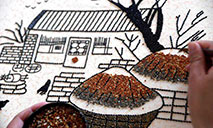Social, political actions called for to counter surging Asian hate in U.S.
The root causes of hate against Asian Americans were the prejudice and the desire to treat other people like objects or take "people different from you as not your own flesh and blood," says Ray Low, a Manhattan pastor.
NEW YORK, March 28 (Xinhua) -- To highlight "StopAsianHate" and demand thorough regulation, multiple marches and demonstrations erupted almost in unison on Saturday in over 60 U.S. cities, including New York, Chicago, San Francisco, Los Angeles, Portland and Atlanta, where the gun rampage on March 16 left eight dead at three spas, six of them Asian women.
The shooting spree in State Georgia, together with a rising wave of similar-nature incidents over the past year, have shocked many Asian Americans across the nation, and led to the alarm, grief and fear of Asian-hate crime tides amid this COVID-19 pandemic era.
The heinous slaying has particularly further sparked both a sense of heightened activism from within the Asian American community and broad-based support from beyond, mirroring a burning public desire to fight the wide-ranging racial discriminations in this so-called beacon country of democracy.
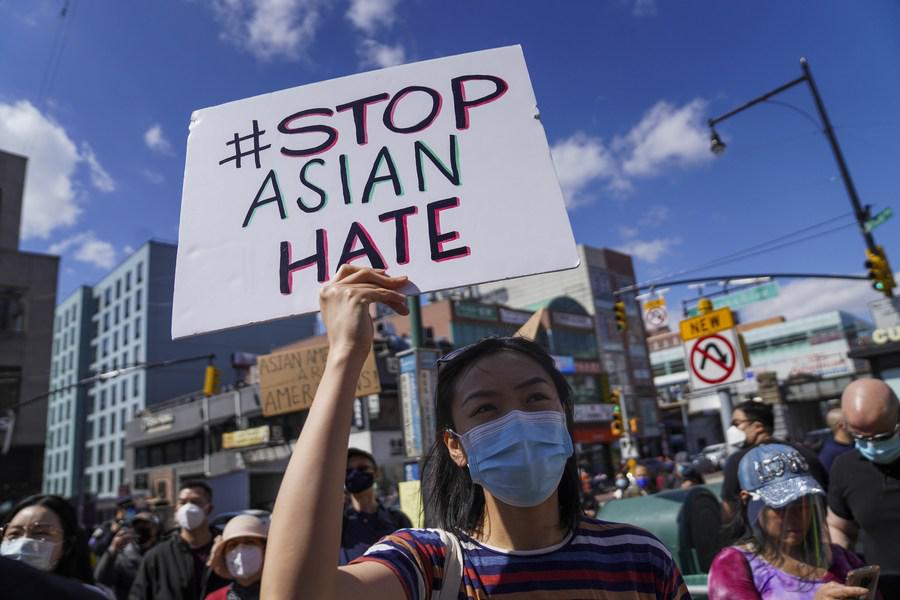
People attend a rally against racism and violence on Asian Americans in Flushing of New York, the United States, March 27, 2021. (Xinhua/Wang Ying)
SATURDAY FURY
Saturday afternoon, hundreds of people of various races and backgrounds rallied and marched in Flushing, a prosperous Asian community in Queens borough of New York City, with several speakers sharing their personal stories about racism and the participants chanting slogans for much of the time. New Yorkers have held at least 10 major rallies since the Atlanta shootings.
As neighbors, friends and students, Asian Americans deserved to be treated with respect and should have safety, said Jordan Wolf, who taught at Flushing International High School.
The root causes of hate against Asian Americans were the prejudice and the desire to treat other people like objects or take "people different from you as not your own flesh and blood," said Ray Low, a pastor working in Manhattan.
"White supremacy is a scourge on this earth and to all people. It needs to be dismantled in order for us to live healthier, happier, more protected lives," said Samantha Evangelis, a second-generation immigrant living in New York.
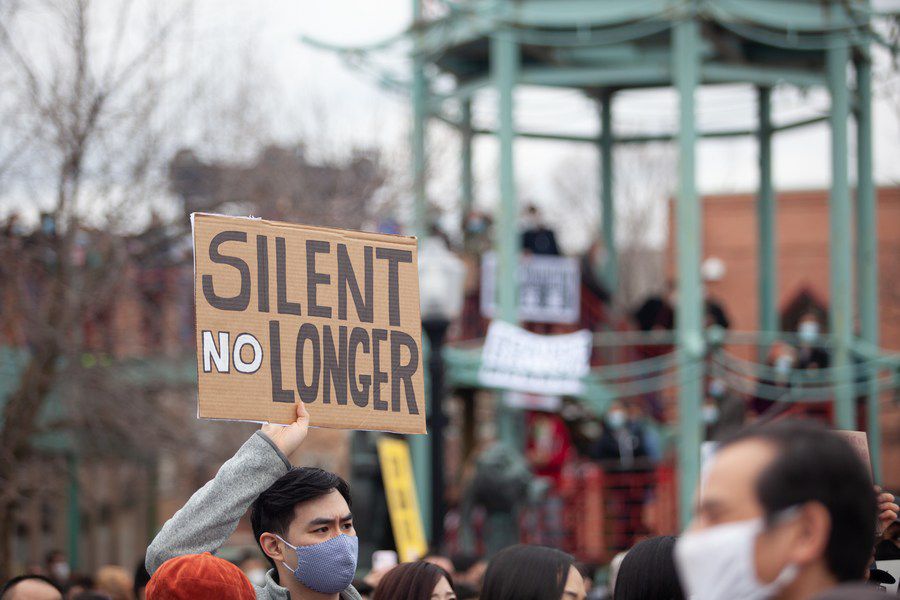
People holding signs take part in a Stop Asian Hate rally in Chinatown of Chicago, the United States, on March 27, 2021. (Photo by Vincent Johnson/Xinhua)
Also Saturday afternoon, more than 1,000 people of various races gathered at Chinatown Square in the South Side of Chicago to protest against increasing crimes targeting people of Asian descents and the recent savage killing in Atlanta.
People holding banners reading "Zero tolerance for racism," "Stop Asian Hate," "I stand with Asian Americans," flocked to Chinatown Square starting noon. Local officials and district police chief, including President of the Cook County Board of Commissioners Toni Preckwinkle and Illinois State Representative Theresa Mah, joined them.
By organizing the event, "we hope to be heard," and to unite local residents under a common goal of building a safer and better Chinese community in cooperation with the local government and the police, Grace Chan, executive director of the Coalition for a Better Chinese American Community, which co-hosted the protest with the Chinatown Security Foundation, told Xinhua in an interview.
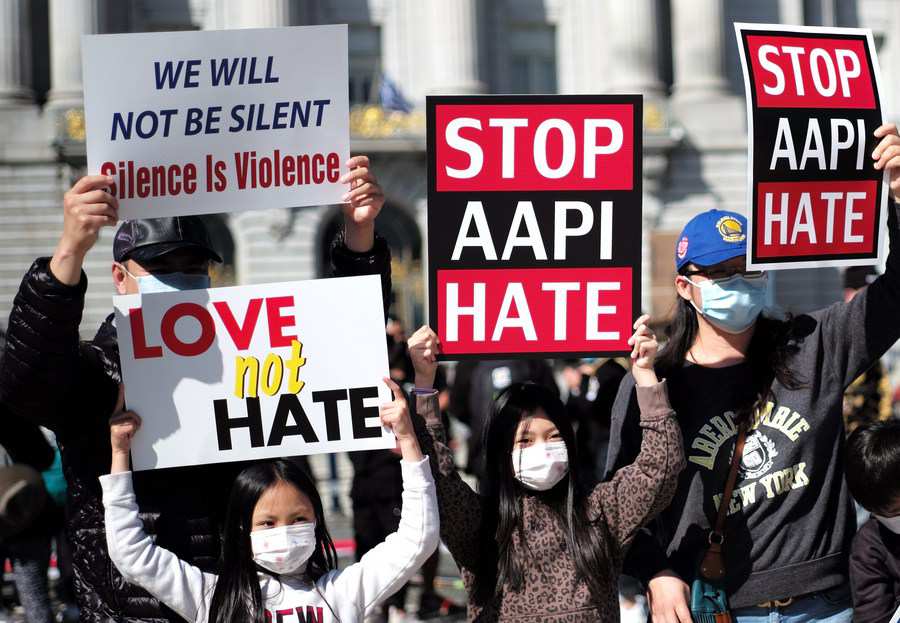
People take part in a rally against racism and violence on Asian Americans at city hall in San Francisco, the United States, March 27, 2021. (Xinhua/Wu Xiaoling)
In San Francisco Saturday afternoon, several "StopAsianHate" rallies were held respectively, and protesters marched from the City Hall and Chinatown, converging at Union Square.
San Francisco Mayor London Breed attended the gathering at Union Square, delivering a speech to call for solidarity to fight against racism.
VOICES HEARD
On Friday, U.S. social media users showed their support for the Asian American and Pacific Islander (AAPI) community by participating in a virtual day of action. The campaign, organized by the advocacy group Stand With Asians, aimed to lobby corporate and political leaders to address the discrimination, inequity and violence faced by Asian Americans.
Organizers said that they selected March 26 for the day of action because the date marked the anniversary of the Naturalization Act of 1790, which restricted U.S. citizenship by naturalization to white immigrants, a barrier that was not removed for all Asians until 1952.
"Today, and everyday, we stand in solidarity, in support, and in shared resolve with the Asian American community. Hate will not divide our states and our communities, and we condemn all expressions of racism, xenophobia, scapegoating, and anti-Asian sentiment," tweeted Delaware Governor John Carney.
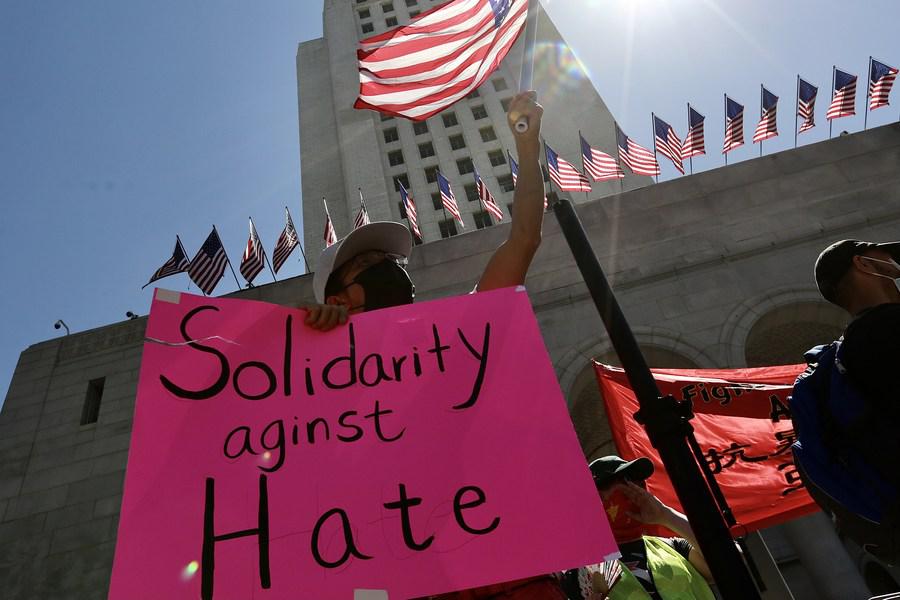
People participate in a Stop Asian Hate rally and march in response to the rising violence against Asian American communities at Los Angeles City Hall, California, the United States March 27, 2021. (Xinhua)
As part of the response on Friday, the Asian American Journalists Association said that Asian American journalists fought to cover the recent fatal shootings at the Atlanta-area spas, but some were met with resistance and rejected when asking for nuanced coverage in newsrooms where they were often underrepresented.
"The professional challenges for AAPIs are complicated and rooted in systemic problems. The range of concerns raised by our members are deeply concerning, and we urge newsrooms to listen to, learn from, and advocate for their employees," the organization said in a statement.
U.S. House Representative Grace Meng of New York said that she remembered the slurs and name-calling she and her fellow Asian Americans occasionally endured on the playgrounds of New York.
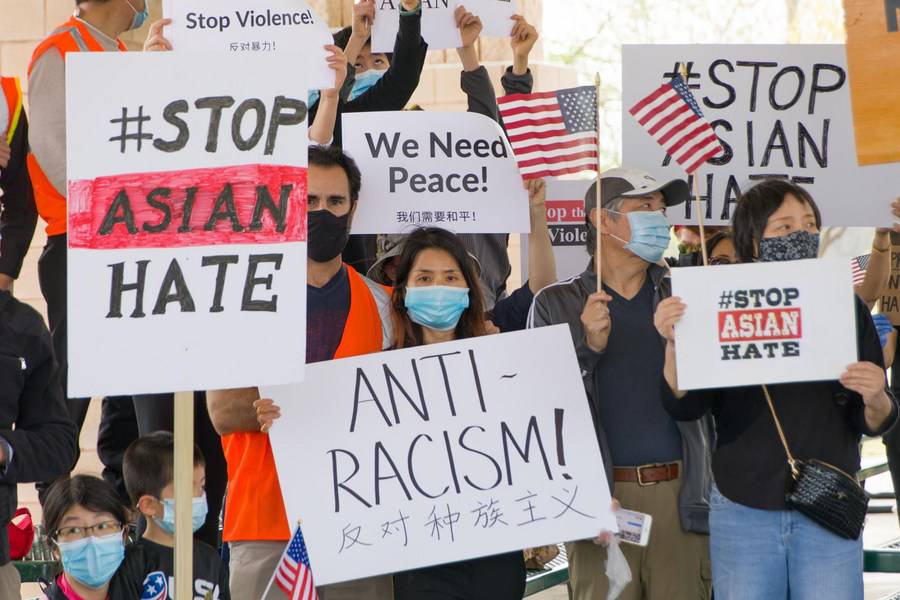
People hold signs at a Stop Asian Hate rally in Plano, Texas, the United States, on March 27, 2021. (Photo by Dan Tian/Xinhua)
"It was just something we grew up with," Meng, who is now in her 40s, was quoted by USA TODAY as saying. "We were taught to mind our own business, not to rock the boat. But what's changed for my generation -- even before the tragedy in Atlanta -- is that people like me were starting to see people who look like their fathers and mothers and grandfathers getting beaten up. That really struck a nerve."
Frank Wu, president of Queens College, City University of New York, compared the moment to the mood following the 1982 killing in Detroit of Vincent Chin, a Chinese American mistaken for Japanese by two struggling auto workers who beat him to death with a baseball bat. The two were eventually fined 3,000 U.S. dollars and sentenced to probation.
"Out of this tragedy," he was quoted by local media as saying, "there is something I always hoped for but hadn't seen until now: real bridge-building intentions. We just need to follow through."
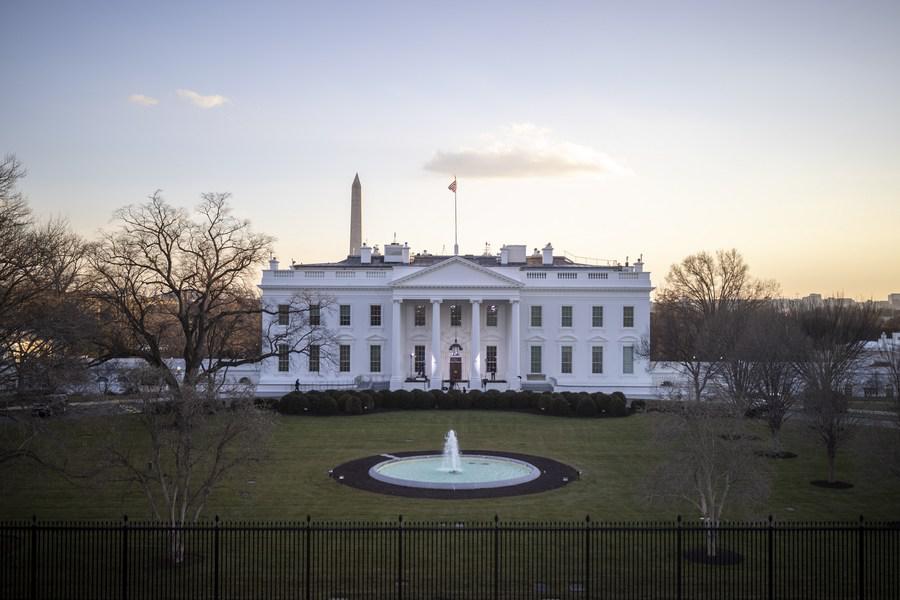
Photo taken on Jan. 20, 2021 shows the White House in Washington, D.C., the United States. (Photo by Ting Shen/Xinhua)
ACTIONS MULLED
Anti-Asian sentiment has grown significantly since the start of the COVID-19 pandemic, with many in the community citing the disparaging rhetoric of the Trump administration as a factor.
San Francisco-based Stop AAPI Hate, which tracks discrimination and xenophobia against AAPIs, tallied nearly 3,800 such incidents from March 2020 through February 2021.
More recently, results of an annual survey conducted by the Anti-Defamation League showed that Asian Americans had suffered the largest spike in severe incidents of hate and harassment online. These figures and estimates give a clear explanation why the current "StopAsianHate" marches and demonstrations has been so strong and wide-ranging.
"It's really important and meaningful that we have had such widespread support from all over the country," said Grace Meng. "As an Asian American born and raised here, I have never felt that in my entire life. We need to make the most of this moment."
Among the long-term solutions, Meng said what she'd like to see is for Americans to better understand each others' histories and contributions, with public education being one way to do that.

People walk across a street backdropped by the U.S. Capitol building in Washington, D.C., the United States, on March 10, 2021. (Xinhua/Liu Jie)
U.S. House Representative Judy Chu of California was among those pushing two hate-related bills for Congressional approval, the No Hate Act and the COVID-19 Hate Crimes Act, both aiming to improve tracking of hate crimes.
"These are things that should have been improved a long time ago," said Chu, noting that the Federal Bureau of Investigation relied on individual states to submit their hate-crime data, "which means that many don't report anything. Eighteen states don't have a mandate, and three states don't even have a hate crime statute. We need to have change there on a national basis."
Illinois Senator Tammy Duckworth threatened on Tuesday to vote against white nominees to U.S. President Joe Biden's administration until more Asian Americans were appointed to high-ranking roles, then withdrew that threat after she received assurances that the White House would do better. Besides Vice President Kamala Harris of Indian descent, there are no Cabinet secretaries of AAPI descent in Biden's administration despite the president's pledge to reflect the nation's diversity.
In related developments, Biden and Harris had met with Georgia state legislators and AAPI advocates to listen to their perspectives on the rise in hate incidents targeting Asian Americans.
Earlier, the president urged Congress to pass the COVID-19 Hate Crimes Act, saying the bill "would expedite the federal government's response to the rise of hate crimes exacerbated during the pandemic." In addition, after the Atlanta killings, Biden's administration is also under pressure to take action on gun control via executive orders.
Photos
Related Stories
- New Yorkers rally against racism, violence targeting Asian community
- 17 pct Asian-Americans experience rise in online hate, harassment: survey
- Why Washington is a human rights double-dealer
- At least 6 killed in mass shooting in U.S. Colorado: local media
- Hundreds gather in Washington to protest against 'Asian Hate'
- U.S. reports over 6,000 coronavirus variants infections
- U.S. value, cyclical stocks remain favored with outbound rotation stalled
- Dialogue, win-win are right choices for China-U.S. relations
- China, U.S. hold candid, constructive dialogue, keeping door open to further communication
- Anti-Asian crime: a plague the U.S. fails to address
Copyright © 2021 People's Daily Online. All Rights Reserved.










